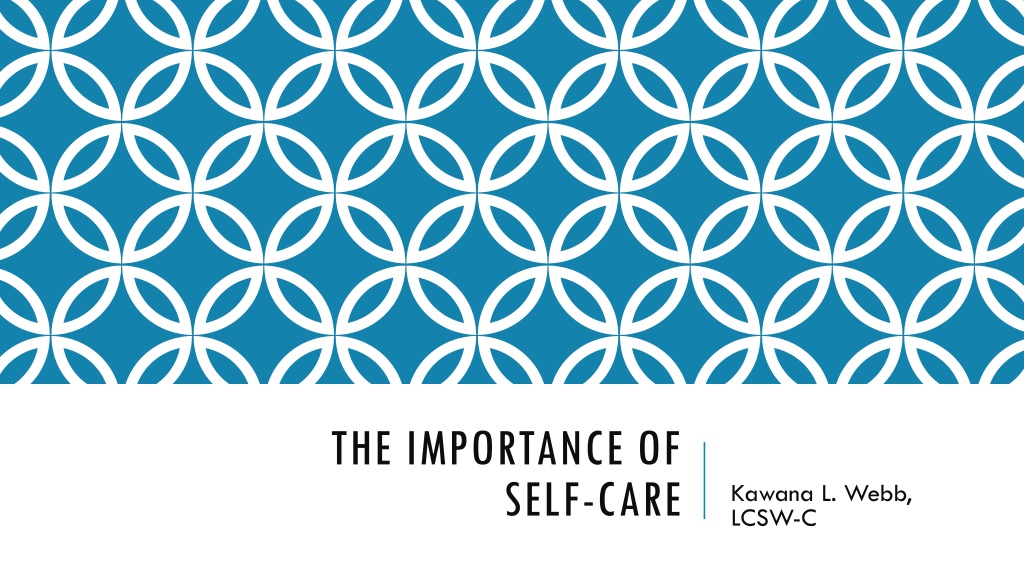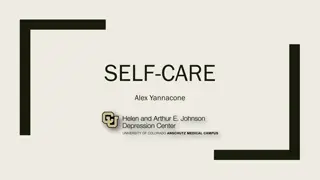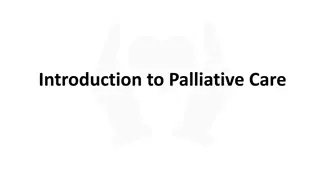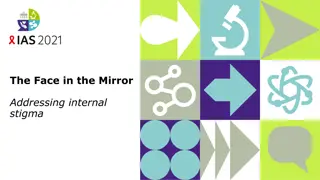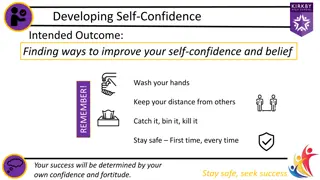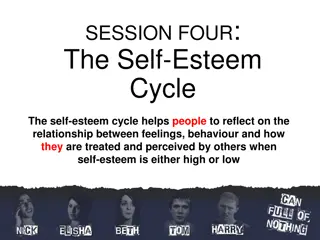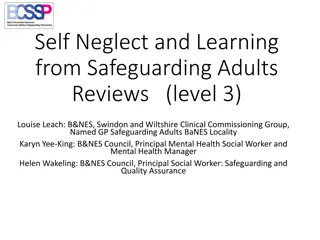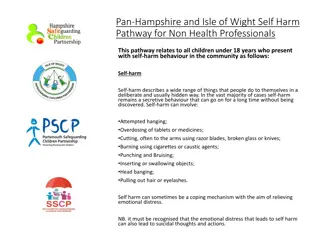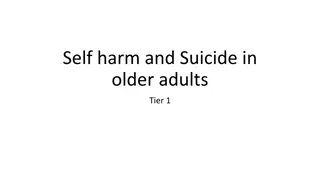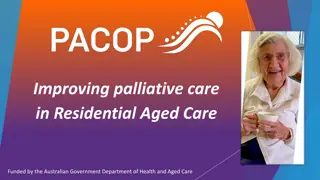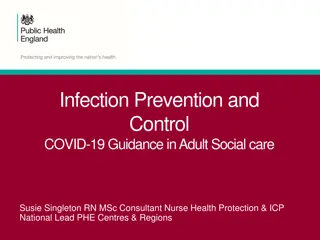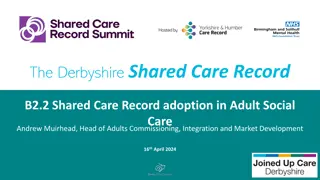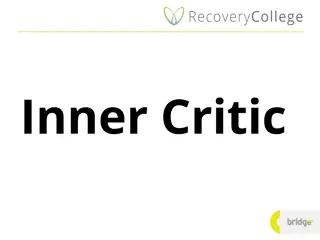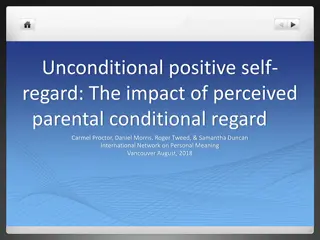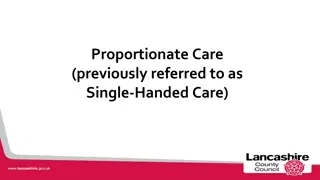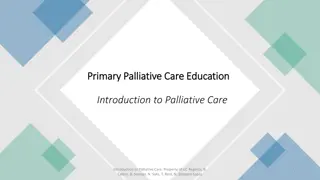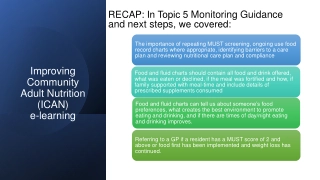Understanding Self-Care: Importance and Impacts
Explore the significance of self-care, learn about concepts and components, and understand compassion fatigue, satisfaction, and burnout. Discover how to integrate self-care practices into your daily routine to combat stress and maintain well-being.
Download Presentation

Please find below an Image/Link to download the presentation.
The content on the website is provided AS IS for your information and personal use only. It may not be sold, licensed, or shared on other websites without obtaining consent from the author. Download presentation by click this link. If you encounter any issues during the download, it is possible that the publisher has removed the file from their server.
E N D
Presentation Transcript
THE IMPORTANCE OF SELF-CARE Kawana L. Webb, LCSW-C
LEARNING OBJECTIVES Provide an overview of the concepts of self-care Increase participants knowledge of the importance of self-care Define components of self care and integrate into practice Demonstrate self-care methods that participants can utilize during times of stress Define burnout, compassion fatigue, compassion satisfaction and secondary trauma and how they affect our everyday life
The expectation that we can be immersed in suffering and loss daily and not be touched by it is as unrealistic as expecting to be able to walk through the water without getting wet ~ Remen
WHAT IS COMPASSION FATIGUE It is a type of stress caused by caring for others It can occur suddenly Symptoms of Compassion Fatigue are: Less ability to function More stress than usual Caregiver feels traumatized Working harder, getting less done Irritability Feeling bored More sickness, aches, and pains http://thecaregiverspace.org/what-is-compassion-fatigue/
WHAT IS COMPASSION SATISFACTION Compassion satisfaction is about the pleasure you derive from being able to do your work. For example, you may feel like it is a pleasure to help others through what you do at work. You may feel positively about your colleagues or your ability to contribute to the work setting or even the greater good of society through your work with people who need care.
WHAT IS BURNOUT? A relatively frequent outcome of chronic stress that has received considerable attention Refers to the gradual extinguishing of energy of a helping professional Schaufeli, Leiter & Maslach, 2009, p. 205 Maslach and Leiter, 2005 Cox and Stiner, 2013
SILVER LINING Burnout is the opportunity to rediscover what makes you happy.
10 SIGNS YOU MAY BE EXPERIENCING BURNOUT 1. Exhaustion 2. Lack of Motivation 3. Frustration, Cynicism and other negative emotions 4. Cognitive Problems 5. Slipping Job Performance 6. Interpersonal Problems at Home & at Work 7. Not Taking Care of Yourself 8. Being Preoccupied with work.. When you re not at work 9. Generally Decrease Satisfaction 10. Health Problems https://www.forbes.com/sites/learnvest/2013/04/01/10-signs-youre-burning-out-and-what-to-do-about-it/#41035838625b
BOUNDARIES AND PROFESSIONALISM When you are stressed/burned out you may find yourself .. * Sharing too much personal information with clients and coworkers * Sharing information about other staff members * Complaining about your agency or workload * Developing dual relationships * Wanting to develop a personal relationship with a client * Downplaying other team members or disciplines They don t work as hard as me . * Upstaging their problems/issues with your own If he think that s bad ..
HOW CAN I ENJOY MY JOB MORE.. 3 psychological tricks that will make you enjoy your job more
BEING PROACTIVE/ BURNOUT PREVENTION 1. Manage your level of stress. Stress can cause physical problems (blurred vision, stomach irritation, high blood pressure) and changes in behavior (irritability, lack of concentration, change in appetite). Note your symptoms and discuss with a doctor, as needed. Try to find relaxation techniques that work for you. 2. Be realistic. The care you give does make a difference, but many behaviors can't be controlled. Grieve the losses, focus on positive times as they arise, and enjoy good memories. 3. Know you're doing your best. Remember that the care you provide makes a difference and that you are doing the best you can. You may feel guilty because you can t do more. 4. Take a break. It's normal to need a break from your daily duties/activities. No one can do it all by themselves. 5. Accept changes as they occur. People are variables and they are forever changing. They may require care beyond what you can provide on your own. Becoming aware of community resources and care options can make your job easier. https://www.alz.org/help-support/caregiving/caregiver-health/be_a_healthy_caregiver
INDIVIDUAL COPING STRATEGIES Exercising allowing for self reflection eating healthy mental health counseling mindfulness Visiting with family & friends Mediation Journaling
YOU KNOW YOU DON T HAVE GOOD SELF CARE WHEN . Give me some examples
SELF-CARE VIDEO https://youtu.be/w0iVTQS8ftg
WHAT IS SELF-CARE Around the room you will find chart paper with the 3 KEY Components of Self Care : MIND SPIRIT BODY Please visit each paper and write an example of self-care for each component Example: MIND Music; BODY Exercise; Spirit Meditate You can look at the Self-Care List for ideas
WHY IS SELF-CARE IMPORTANT It leads to Poor Quality of Life Poor self-care = burnout = dissatisfaction = leaving the social work/home visiting field Poor self-care = reduced ability to be empathic In light of recent and significant research indicating that social workers engaged in direct practice are likely to develop symptoms of secondary traumatic stress, it is imperative that the social work profession devotes greater attention to and creates greater awareness of these issues. (Professional Self- Care and Social Work, policy statement approved by the NASW Delegate Assembly, 2008)
LETS DEVELOP OUR SELF CARE PLAN https://youtu.be/GWwwPb6akqA?t=14
LETS DEVELOP A PERSONAL SELF CARE PLAN __________________________________ s Self Care Plan! Mind Body Supportive People in My life I want to Accomplish Spirit
TOP SELF-CARE TIPS FOR HELPING PROFESSIONALS * Take inventory of where things are What s on your plate? * Start a Self-Care Idea Collection * Find time for yourself everyday * Delegate & learn to ask for help * Have a transition from work to home * Learn to say yes or no more often * Assess your trauma inputs work/non-work related * Learn more about Compassion Fatigue and trauma * Make time for supervision and/or peer support * Attend workshops and trainings
